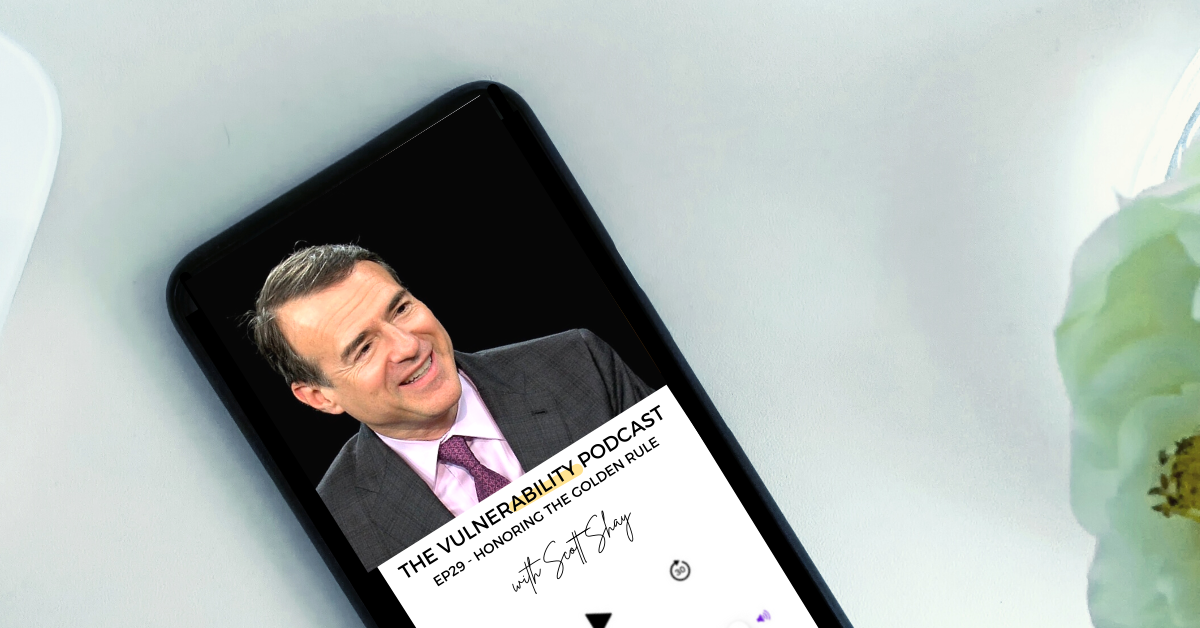Podcast: Play in new window | Embed
Subscribe! Apple Podcasts | RSS | More
What does it mean to have faith? And how can people—regardless of their religious beliefs—connect with one another? These are the questions host Marisa Donnelly and guest Scott Shay, Wall Street businessman and author of In Good Faith, discuss in this podcast episode.
“People become drunk with their own power,” Scott says, explaining that this contemporary version of idolatry keeps us from finding commonality and connections with one another. At the end of the day, when we’re so focused on our personal ‘bubbles’ – perspectives, ideas, experiences – we can’t find ways to understand and respect one another.
In this episode, Scott and I discuss that there is only one fundamental truth that connects us—regardless of whether we identify as a monotheist or atheist—and that’s the ‘Golden Rule.’
Highlights from the Episode:
[4:11] “People become drunk with their own power.”
[9:00] “People deify themselves and use money as a tool.”
[10:25] “I think the one thing that can bridge believers sand non-believers is the ‘golden rule (which [in] the way the Bible says) ‘Don’t do unto someone else what you wouldn’t want done to you.’ And that means looking out for the other person.”
[12:00] “It’s so easy to walk away… but the Bible is saying even though there’s a personal cost and even though it might be hefty, you can’t avert your gaze.”
[17:45] “If you don’t believe in the ‘golden rule,’ then fundamentally you don’t believe in the beginning of the Bible, which is that everybody is created in the image of God—man, woman, every race, every creed—we all share that same spark of divinity. And if you don’t believe that, then I don’t think you’re really grasping the Bible.”
[18:20] “The ‘golden rule’ applies to all things—not just to the group you happen to be a member of.”
[18:45] “At the core, we’re all created equal… And when you keep sight of that, first and foremost, then it helps all the other decisions and perspectives stem out from that. But if you don’t have that, you don’t have [faith].”
[20:05] “Prayer is that one point when you can’t make any excuses because you have the harshest light, the brightest light on you. Because you can’t lie to the Almighty! So it forces you to look at yourself and say, ‘Okay, where am I screwing up? What am I not doing? Where am I averting my gaze? Where am I nursing grudges that I shouldn’t be nursing, or avoiding topics and people that I really need to grasp? Or not dealing with a wrong that’s right in front of me.’
…And if prayer’s really working and it goes beyond… to the real, hard work of prayer… then that’s where you can get in touch with your authentic self.”
[21:40] “Prayer is about a relationship… and it’s about a clearer look at ourselves. It’s like looking into a mirror and really seeing your reflection so that you can then reflect that onto other people.”
[26:50] “I think if we expose ourselves to [the] bright light that only the Almighty can shine on us, or we can only shine on ourselves when we’re talking to the Almighty—where there’s no way to lie to ourselves, or the Almighty, and we know that we’re doing and being our best selves—then we can feel comfort and [at] ease.
[27:20] “Even if we can’t see the immediate reason for whatever the outcome is, it’s the right outcome.”
[29:45] “What prayer does is offer is that additional coordinate of, ‘Am I doing something that is going to be better for the world?’”
[30:35] “Prayer is about not only you, but [about] your purpose on earth.”
[30:45] “If you’re looking at yourself and then you’re looking outward and thinking, ‘How can I follow that golden rule?’ and embodying that golden rule and really investing and caring about other people, then that’s going to make that change.”
[32:00] “Humility isn’t about shrinking.”
[32:30] “Pray as if everything depends on God, and act as though everything depends on you.”
Recommended Reading/Resources Mentioned:
- Scott’s Website & Book: In Good Faith: Questioning Religion and Athesim.
To listen to more VulnerABILITY Podcast episodes, click here.


